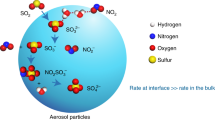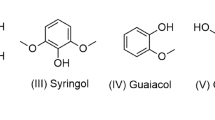Abstract
BASED on the fact that the measured values of carbon dioxide of atmospheric air samples never could be determined as specific (using Pettenkofer's titration method CO2 values of 0.025–0.037 per cent/vol. were measured) a series of tests have been performed over a period of years to explain these irregularities. While some years ago the influence of light as opposed to darkness and the influence of temperature on the CO2 values could be proved1–3, the existence of a substance which acts as a catalyst and which seems to play an essential part in the deviations of the measured CO2 values was determined by these last tests.
This is a preview of subscription content, access via your institution
Access options
Subscribe to this journal
Receive 51 print issues and online access
$199.00 per year
only $3.90 per issue
Buy this article
- Purchase on Springer Link
- Instant access to full article PDF
Prices may be subject to local taxes which are calculated during checkout
Similar content being viewed by others
References
Balcarczyk, L., and Lanzel, E., Acta Physica Austriaca, 16, 270 (1963).
Balcarczyk, L., and Lanzel, E., Acta Physica Austriaca, 16, 274 (1963).
Balcarczyk, L., Lanzel, E., and Stetter, G., Acta Physica Austriaca, 18, 64 (1964).
Author information
Authors and Affiliations
Rights and permissions
About this article
Cite this article
BALCARCZYK, L., LANZEL, E. Identification of Carbonic Anhydrase in an Atmospheric Aerosol. Nature 205, 797–798 (1965). https://doi.org/10.1038/205797a0
Issue Date:
DOI: https://doi.org/10.1038/205797a0
Comments
By submitting a comment you agree to abide by our Terms and Community Guidelines. If you find something abusive or that does not comply with our terms or guidelines please flag it as inappropriate.



